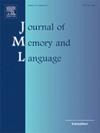跨语言预测单词依赖于语言语境:来自视觉世界眼球追踪的证据
IF 3
1区 心理学
Q1 LINGUISTICS
引用次数: 0
摘要
有充分的证据表明,单语理解者可以预测即将出现的单词的形式,而且双语者在自下而上的语言理解过程中经常同时激活两种语言中的单词。但目前还不清楚双语者是否能预测他们没有听到的语言中即将出现的单词的形式,以及这种预测是否取决于他们最近是否遇到过这种语言。在两个视觉世界眼动追踪实验中,我们考察了汉语-英语双语者在英语理解过程中是否预先激活了可预测单词的汉语语音表征。参与者在观看展示时听到包含一个高度可预测单词的英语句子。当同时使用两种语言时(实验2),受试者对竞争对象的关注程度高于对不相关对象的关注程度(实验1),而当只使用英语时,受试者对竞争对象的关注程度高于对不相关对象的关注程度。我们的研究结果表明,当两种语言都与上下文相关时,双语者会跨语言进行预测。本文章由计算机程序翻译,如有差异,请以英文原文为准。
Predicting words across languages depends on language context: Evidence from visual world eye-tracking
There is good evidence that monolingual comprehenders can predict the form of upcoming words, and also that bilinguals often activate words from both languages in parallel during bottom-up language comprehension. But it is unclear whether bilinguals predict the form of upcoming words in the language that they are not hearing, and whether such predictions depend on whether or not they have recently encountered that language. We investigated these questions in two visual-world eye-tracking experiments by asking whether Mandarin Chinese (L1)-English (L2) bilinguals pre-activate Mandarin phonological representations of predictable words during English comprehension. Participants heard English sentences containing a highly predictable word while viewing a display. They fixated more on a competitor object whose Mandarin name was a homophone of the Mandarin translation of the predictable word than an unrelated object when both languages were used (Experiment 2) but not when just English was used (Experiment 1). Our findings suggest that bilinguals predict across languages when both languages are contextually relevant but not otherwise.
求助全文
通过发布文献求助,成功后即可免费获取论文全文。
去求助
来源期刊
CiteScore
8.70
自引率
14.00%
发文量
49
审稿时长
12.7 weeks
期刊介绍:
Articles in the Journal of Memory and Language contribute to the formulation of scientific issues and theories in the areas of memory, language comprehension and production, and cognitive processes. Special emphasis is given to research articles that provide new theoretical insights based on a carefully laid empirical foundation. The journal generally favors articles that provide multiple experiments. In addition, significant theoretical papers without new experimental findings may be published.
The Journal of Memory and Language is a valuable tool for cognitive scientists, including psychologists, linguists, and others interested in memory and learning, language, reading, and speech.
Research Areas include:
• Topics that illuminate aspects of memory or language processing
• Linguistics
• Neuropsychology.

 求助内容:
求助内容: 应助结果提醒方式:
应助结果提醒方式:


